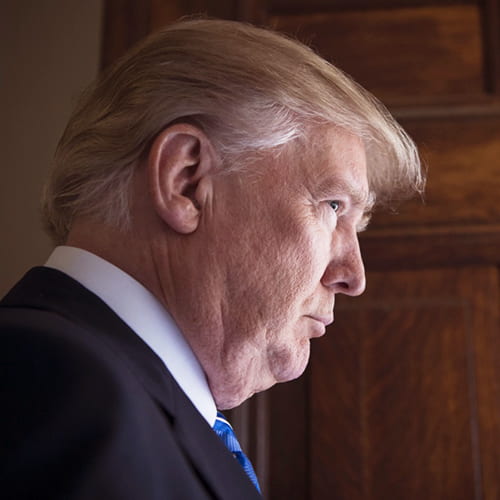By Gary Hale
Nonresident Fellow in Drug Policy and Mexico Studies
The proposed designation by President Donald Trump of Mexico’s drug cartels as foreign terrorist organizations (FTO) is a double-edged sword that will have limited impact on the mayhem caused by those organized criminal groups and will likely have negative effects on trade, commerce and other crucial aspects of the U.S.–Mexico relationship. The gains that Trump has made through Mexico’s cooperation toward reducing the number of migrants reaching the U.S. southern border could also suffer significantly should U.S. forces intervene in any manner in Mexico, including a surgical attack against any one member of a cartel or any one of the several cartels that are operating throughout Mexican territory.
The FTO designation should not be taken lightly. Many reports have confused the FTO designation as being the same as the Foreign Narcotics Kingpin Designation Act, which is designed to deny foreign drug cartel kingpins and their support system access to the U.S. banking or financial system. The targets of the Act are managed by the Treasury Department’s Office of Foreign Assets Control (OFAC); criminal acts lead to administrative sanctions and do not involve overt military action. In contrast, the FTO designation is a decidedly more lethal weapon because designees are considered enemy combatants who can legally be killed — the same as if the FTO nominee were wearing a uniform of an enemy military force and attacking U.S. forces on the battlefield.
Let’s look at a recent example of how an FTO designation was lethally applied. Osama Bin Laden (OBL) and Al Qaeda were designated as FTOs. As we witnessed, OBL was a verifiable enemy combatant and was justly killed during an extraterritorial raid in Pakistan, a third country that neither had knowledge of the impending action or nor approved U.S. military intervention inside its sovereign territory. Notwithstanding that 9-11 and other terrorist acts committed by OBL provided justification to the U.S. for the OBL raid, the FTO designation of Mexican targets could just as easily lead to similar unilateral action inside Mexico by U.S. special operations forces, drone attacks, or other specific and limited military action against individual Mexican criminals, their organizations or their infrastructure — exponentially more provocative acts than seizing money from bank accounts.
Unlike OBL and Al Qaeda, many more individuals in Mexico could end up listed as FTOs and could be killed by the U.S. for the terroristic actions they commit in Mexico, albeit mostly against Mexicans. Thus, if a Mexican criminal is designated as an enemy combatant as a result of an FTO designation, that civilian could be subject to execution through U.S. military action, an act of war in which a person is summarily killed without benefit of a full and fair trial. That is hardly the “American Way.” While the loss of any life, Mexican or American, at the hands of Mexican criminals is reprehensible and worthy of a death sentence levied by a duly empaneled jury, the U.S. should not make the mistake of misapplying U.S. military power against what can arguably be said to be, and should remain, a set of judicial targets. This cabal of criminal thugs should instead continue to be prosecuted by the Mexico and U.S. judicial systems and not mislabeled as military combatants for political purposes.
The current situation provides Trump a unique opportunity to throttle back from his hyperbolic threats that imply the U.S. should intervene in Mexico. Trump should instead capitalize on the security vacuum created by Mexico’s President Andres Manuel López Obrador (AMLO) since he took office one year ago and agree to provide more support to Mexico. If ever there was a time to ramp-up security assistance and bilateral cooperation with Mexico, the time is now. AMLO has demonstrated that he is willing to work with the U.S. on thorny issues like immigration. He recently stated in response to Trump’s threats that he would welcome cooperation from the U.S. The U.S. should quickly propose another assistance program like the Bush-Calderon-inspired Merida Initiative and provide Mexico with more law enforcement, intelligence and judicial tools and talent so that Mexican criminals can be brought to justice in either Mexico or the U.S., whether for the murders they commit by spilling blood in their own nation, or for the deaths the commit by sending deadly drugs into the U.S. This would neither provide “hugs for thugs” (“abrazos, no balazos”) as proposed by AMLO, or “bullets for bad guys,” as proposed by Trump, but rather appropriately subject criminals to the systems inherent to civilian rule of law that both countries should respect.
